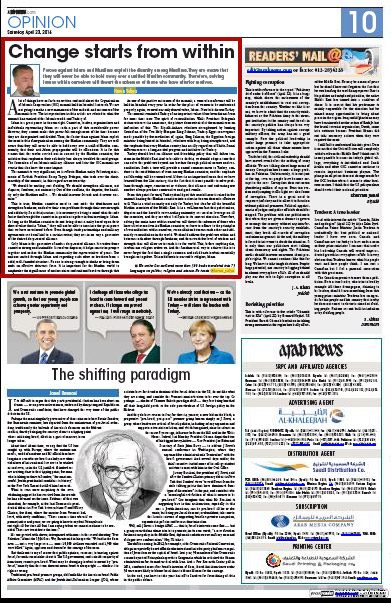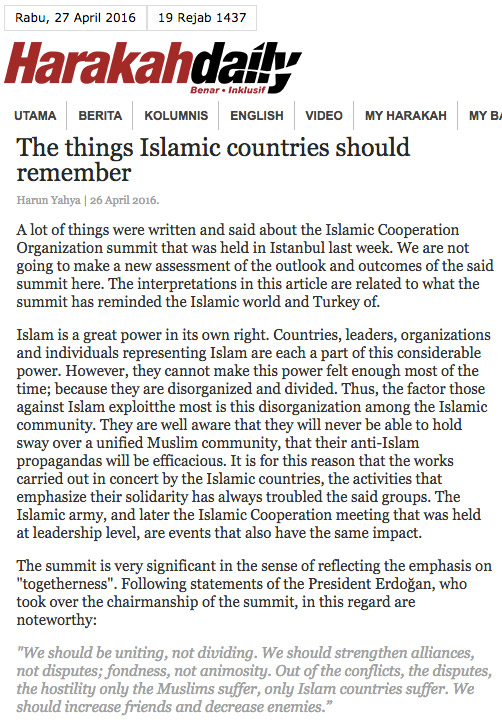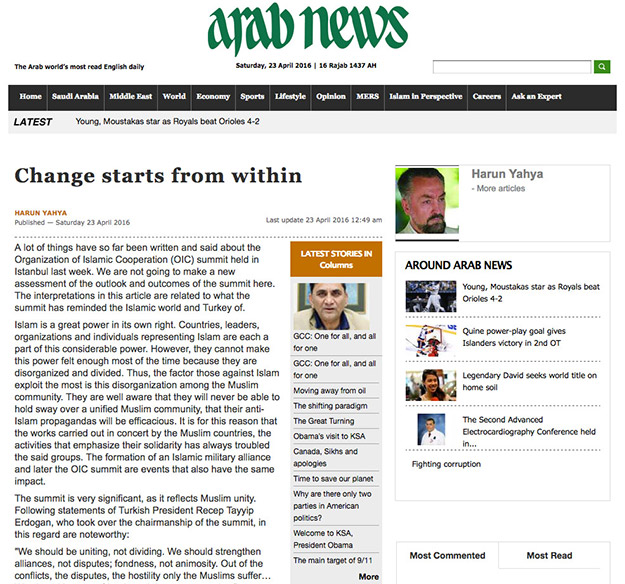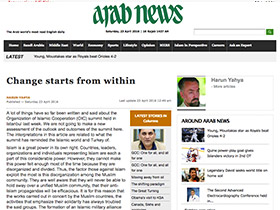
A lot of things have so far been written and said about the Organization of Islamic Cooperation (OIC) summit held in Istanbul last week. We are not going to make a new assessment of the outlook and outcomes of the summit here. The interpretations in this article are related to what the summit has reminded the Islamic world and Turkey of.
Islam is a great power in its own right. Countries, leaders, organizations and individuals representing Islam are each a part of this considerable power. However, they cannot make this power felt enough most of the time because they are disorganized and divided. Thus, the factor those against Islam exploit the most is this disorganization among the Muslim community. They are well aware that they will never be able to hold sway over a unified Muslim community, that their anti-Islam propagandas will be efficacious. It is for this reason that the works carried out in concert by the Muslim countries, the activities that emphasize their solidarity has always troubled the said groups. The formation of an Islamic military alliance and later the OIC summit are events that also have the same impact.
The summit is very significant, as it reflects Muslim unity. Following statements of Turkish President Recep Tayyip Erdogan, who took over the chairmanship of the summit, in this regard are noteworthy:
"We should be uniting, not dividing. We should strengthen alliances, not disputes; fondness, not animosity. Out of the conflicts, the disputes, the hostility only the Muslims suffer… We should increase friends and decrease enemies.”
This is true; Muslim countries need to cast aside the dissidences and strengthen fondness, and solve their own problems through their own strength and solidarity. So at this juncture, it is necessary to bring to mind what the sole factor that brought the countries in question together in that meeting is: Islam. So long as the Muslim countries do not bring about a unity based upon their shared value that is “Islam,” they will not be able to turn into the great power that we have mentioned before. Even though trade partnerships and military agreements are beneficial to a certain extent, they are in no way a guarantee of the desired deep-rooted alliance.
Only Islam is the guarantee of such a deep-rooted alliance. It renders those countries strong and invincible. It resolves disputes; it helps countries prosper together and makes the Muslim community the representative of peace. The nations united through Islam and regarding each other as brothers form a solid, well-founded structure. No one is strong enough to shake or bring down such an effective deterrent force. It is important for the Muslim world to emphasize the significance of nation states and national borders through this conference.
As one of the positive outcomes of the summit, a women’s conference will be held in Istanbul every year. In order for the place of women to be understood properly, again, we need our only shared value, Islam. Now let’s discuss Turkey.
The summit reminded Turkey of an important value it has been distant from for some time now: The spirit of reconciliation. While President Erdogan’s statements were its assurance, the picture demonstrated at the summit was an indication of this. The Riyadh-Ankara relations strengthened by hosting Custodian of the Two Holy Mosques King Salman, Turkey-Egypt convergence made possible by the mediation of, again, King Salman, the Egyptian foreign minister being hosted in Istanbul, relations with Iraq being strengthened, and the emphasis that every Muslim country has an ally regardless of Shiite-Sunni differences were a long-needed progress and initiative for Turkey.
Turkey should lead an alliance and friendship policy that will defuse tensions in the Middle East. And to be able to do this, we should adopt a tone that can solve the problems beyond our borders through political means and reconciliation. Such a tone will provide a sound common sense to Turkey, conduce to the establishment of trust among Muslim countries, and the emphasis on fellowship will be remembered. If there is an important lesson that we have learned from the 21st century, it is the fact that it is not possible to solve problems through anger, resentment or violence, that alliance and embracing one another always produce constructive and good results.
From this point forward, Turkey should put this crucial issue it raised in the summit hosting the Muslim countries into action in its own domestic affairs as well. This is a vital necessity not only for Turkey, but also for all the beautiful Muslim countries of the Middle East. It is a well-known fact that polarization, disputes and the horrible never-ending animosity are used as leverage on all the countries, and they are what led Syria to its current situation. Therefore, solving the main issue within ourselves will thwart the schemes of those who have ulterior motives. As Muslim countries, we have to adhere to the principles of reconciliation within ourselves, reconciliation between each other and ultimately reconciliation in the world. We should address the problems within and between each other through fondness, and then reach the level of wisdom and strength that will allow us to teach it to the world. This, before anything else, is what our religion orders us. And the fundamental way to achieve this is to never forget the fact that a single common and solid basis is what essentially brought us together. This solid basis is our noble religion, Islam.
Adnan Oktar's piece in Arab News & Harakah Daily:
http://www.arabnews.com/columns/news/914306




